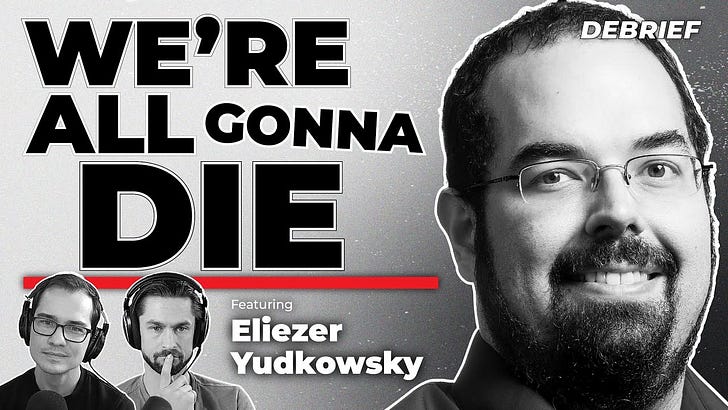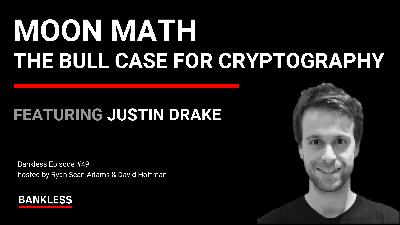🎙️ Early Access: The Fourth Crypto Cycle | Chris Dixon
Description
Chris Dixon, a general partner at a16z, comes to the Bankless to discuss how can blockchain technology meaningfully impact the world’s 4 billion internet users.
You have early access to this episode and a copy of the transcript as a full Bankless Member.
Listen in Podcast App | iTunes | Spotify | YouTube | RSS Feed
Tools from our sponsors to go bankless:
⭐️ AAVE - BORROW OR LEND YOUR ASSETShttps://bankless.cc/aave
🚀 GEMINI - MOST TRUSTED EXCHANGE AND ONRAMPhttps://bankless.cc/go-gemini
💳 MONOLITH - GET THE HOLY GRAIL OF BANKLESS VISA CARDShttps://bankless.cc/monolith
📈 KWENTA | DERIVATIVES TRADING WITH INFINITE LIQUIDITYhttps://bankless.cc/kwenta
📺 The Fourth Crypto Cycle | Chris Dixon
January 8th, 2021
Chris Dixon is a general partner at a16z, a famous private American venture capital firm that has specialized in technologies related to the growth of the internet and computation.
Chris transcends the pre-internet, post-internet, pre-crypto-and post-crypto worlds of investing and venture capital, so his perspective is rich, deep, and consistent with the themes that transcend these revolutions.
Coming from a16z, Chris approaches this industry from a technological perspective, rather than a monetary one, and seems to be steering the a16z Crypto Fund ship in the direction that typical silicon valley venture capital investors focus on: how can blockchain technology meaningfully impact the 4 billion users of the internet.
This conversation with Chris was fast-paced and vibrant! Tune in to hear one of Tech's most experienced investors!
Resources mentioned in the podcast
* Book Chris mentioned: “The Company”
* The Crypto Price-Innovation Cycle
* Doing Old Things Better Vs. Doing Brand New Things
* What is Blockchain: Computers That Can Make Commitments
* Crypto startup school - fantastic educational content (particularly for builders)
TRANSCRIPT
RSA
Bankless Nation we have a special guest today, we want to welcome Chris Dixon, who is an investor and partner at Andreessen Horowitz. It's a VC firm that probably needs no introduction. He leads crypto investing there. Chris is someone who shaped my mental models for how to see the next big thing while everyone else dismisses it as a toy, including crypto. Chris, welcome to Bankless. How are you doing?
Chris Dixon
I'm great. Thanks for having me.
RSA
Chris, you are a seasoned VC. You were early to the internet. You're early to crypto. Now you're on Andreessen Horowitz's crypto fund leading that. On Bankless, we're really on a mission into the crypto frontier. So we're investors, yes. But we're also users and builders. And what we're hoping to get out of today's conversation is to get like your mental models to understand what you think crypto holds for the next decade. I mean, we've just kicked off this decade. So you know, where we want to start is actually at the high level, at the 20,000 foot view in crypto. What is going on here? Like, what is crypto? What's happening here?
Chris Dixon
Yeah, so I mean, the way I kind of look ... so, let's step really far back. Why when you go and you and you look at a movie from the 1990s, a lot of things look the same. If you go back and look at the TVs and movies from 1990s, like the cars look the same, and the appliances look the same. And the washing machines look the same. But that was very, very different time for computers, right? Over the last 50 years, we've had a very rapid acceleration of better and better computers, better and better connectivity, more and more apps. To me, the most important question when analyzing the past and future of technology is to dig deeply into, you know, what are computers? How does each computing cycle develop? What are the ingredients that go into that development. I see crypto blockchain very much as a new cycle of computing, that fits into that history. So that history is, you know, mainframe computers in the 50s and 60s, PCs in the 70s and 80s. Internet in the 90s and 2000, mobile phones 2000 to 2010. Now, I think we're, you know, on the cusp of a whole bunch of exciting things are stuff going on in AI machine learning, this stuff happening in virtual reality and augmented reality, self driving cars, etc. But to me the most important of this, what I'm most passionate about, and I think will be one of the most impactful areas of kind of new computing is around, you know, what you might call blockchain computers, right? And this can be anything from an application specific blockchain computer like Bitcoin, right? So Bitcoin is a computer that has a specific application, i.e., you know, sort of global censorship resistant store of value baked into it. And it's a very important, obviously, innovation in and of itself. And then you have things like Ethereum, which are more generalized plus general purpose platforms that'll let you, you know, fully program on them. And then you have a whole bunch of other kind of aforementioned things getting layered on top. And I think of it now just sort of drilling into it, I think one of the interesting things you can ask is, when you sort of try to analyze what has happened, and what will happen is where are we in the evolution of the cycle? I've written a lot of blog posts and things about this, if folks are interested. But I think most of these kind of computing cycles go through multiple phases. The first one I call the kind of gestation phase. The second one, the second one is the deployment phase. Like, you know, I think, a really interesting question, and we can talk about this later, is that where are we in that cycle? What are the other key innovations that to happen? One of the really important things that happens, and I think we're starting to see it now in any of these kinds of computing cycles, is you get a reinforcing feedback loop between the infrastructure and applications. So you know, as the first iPhone started off with relatively few applications and kind of weak infrastructure in terms of its cellular connectivity, you know, kind of weak camera things like this, then as you know, as some applications became popular like Instagram, Snapchat, that in turn created an economic incentive for Apple to go and invest and make better cameras. And so you had this sort of nice kind of ladder effect reinforcing feedback loop, the applications got better and the infrastructure got better. I think we're kind of starting to hit that in crypto right now. Anyways, that's a lot right there to start with, but, uh, you know, happy to happy to dive into any area.
RSA
Yeah so we want to get back to cycles, because you've written a lot about this. And I think everyone's wondering like, okay, we're 10 years into this, where are we in the cycle? But before we do, let's talk a bit about what's unique about next era of computing, right? So you took us through the progression, we had mainframes PCs, mobile internet, right and each of these computer paradigms era has had special things you know, PCs have brought computer to your home, the internet networked all of these computers together so we could like you know, communicate across the world. What is special about these new computers that we call blockchain or cryptoeconomic computers?
Chris Dixon
It's a great question. I think this is one thing, one of the reasons people are so thrown off by this. So a lot of the people at you know, at, let's say, a company like Google, who are very, who wrote the last two computing waves, right, and who very intimately understand the transition from, let's say, desktop to mobile computing. A lot of those same people don't really fully grok blockchain computers, in fact, a lot of them are actually hostile towards it. And I believe the reason for that is blockchains, they in some ways fit the pattern in that they're, you know, they are a new type of computer that has new capabilities, new sets of trade offs, etc. But the dimensions along which blockchains offer new capabilities are different than what we're used to. Right. So in the past, what we're used to is computers getting smaller, more mobile, higher performance, more connected Blockchains, the way I like to describe it is they are computers that can do a new thing that can never be done before. And that specifically is, they can make commitments, commitments that cannot be overridden b





















